高中英语语法 状语从句 课件 (共35张PPT)
文档属性
| 名称 | 高中英语语法 状语从句 课件 (共35张PPT) |

|
|
| 格式 | zip | ||
| 文件大小 | 195.8KB | ||
| 资源类型 | 教案 | ||
| 版本资源 | 通用版 | ||
| 科目 | 英语 | ||
| 更新时间 | 2018-12-02 00:00:00 | ||
图片预览

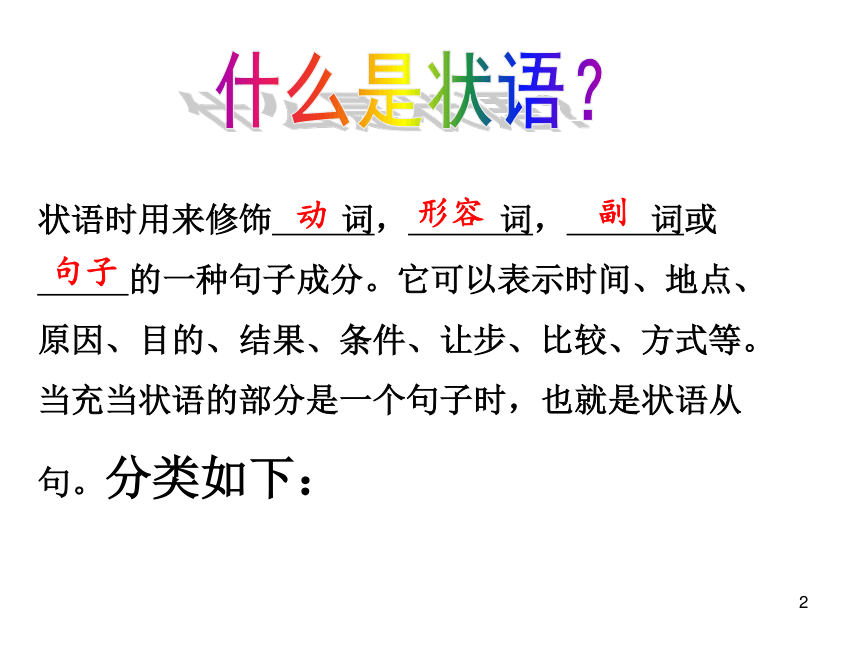
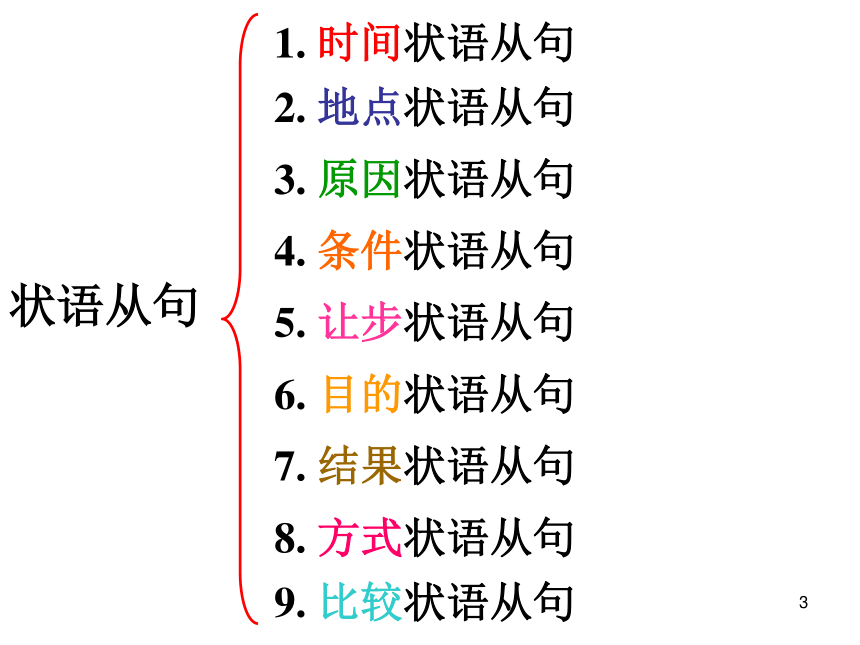
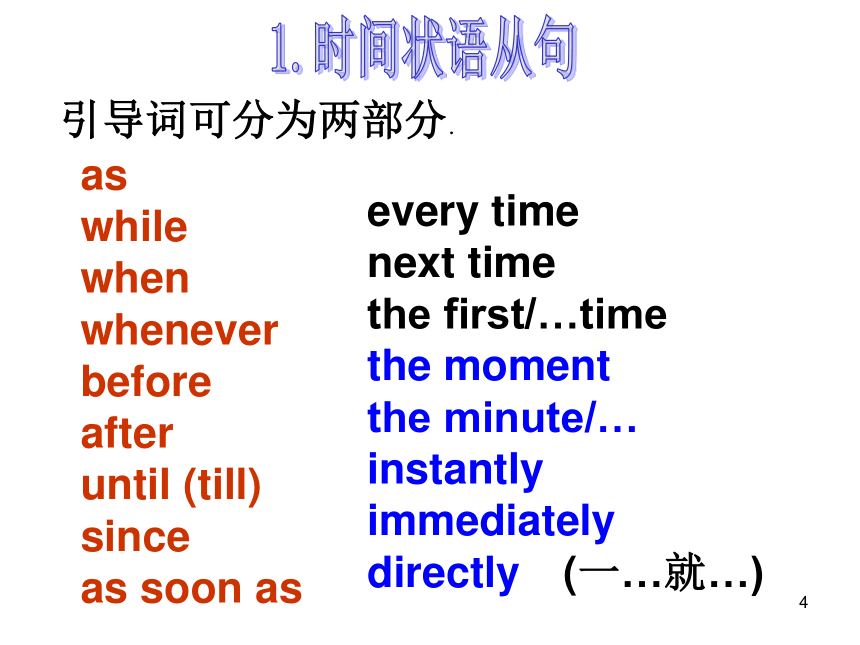
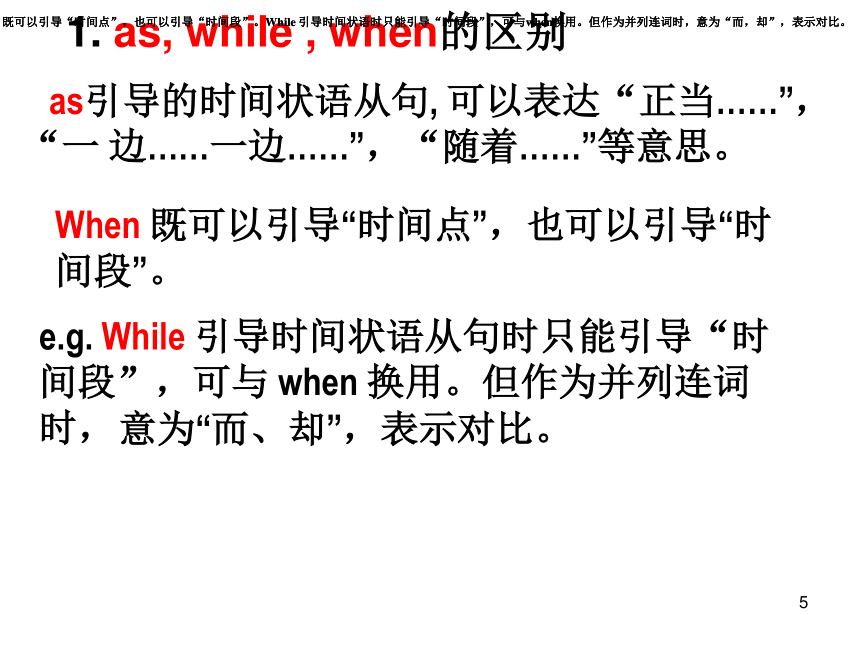
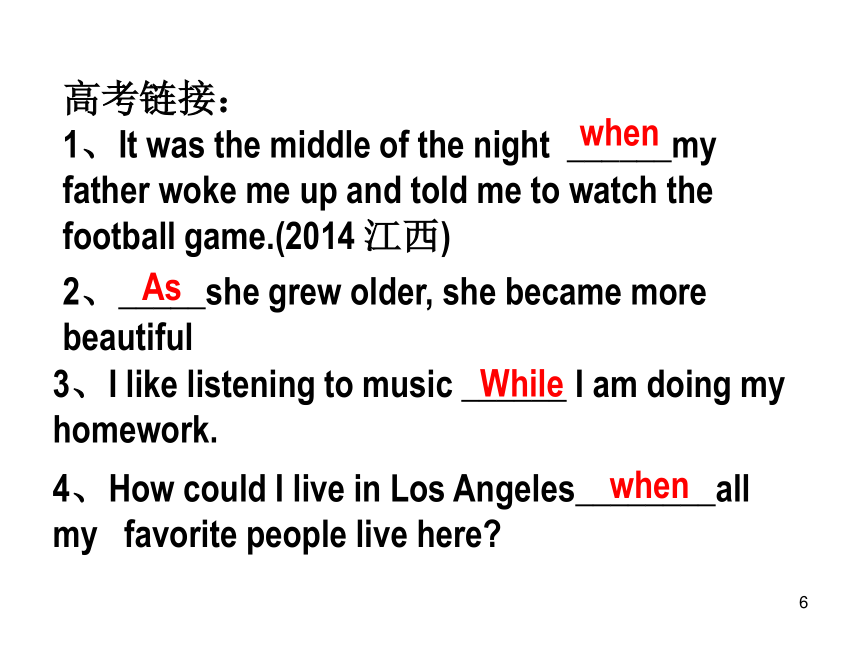
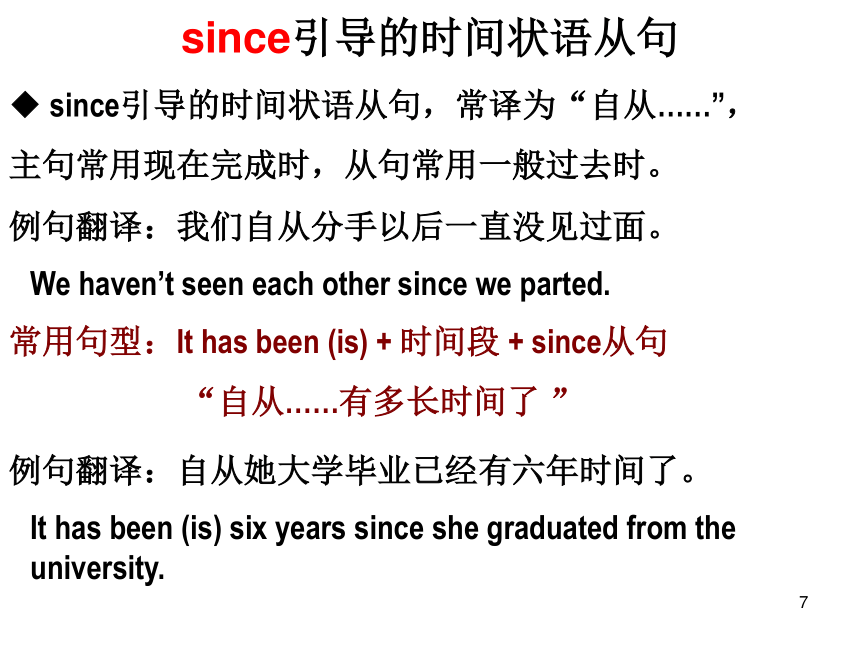
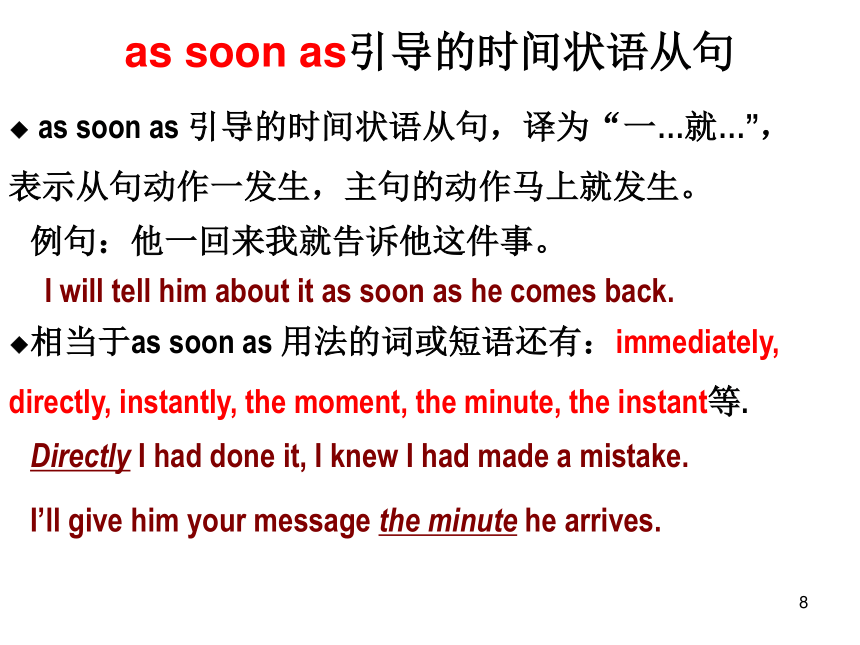
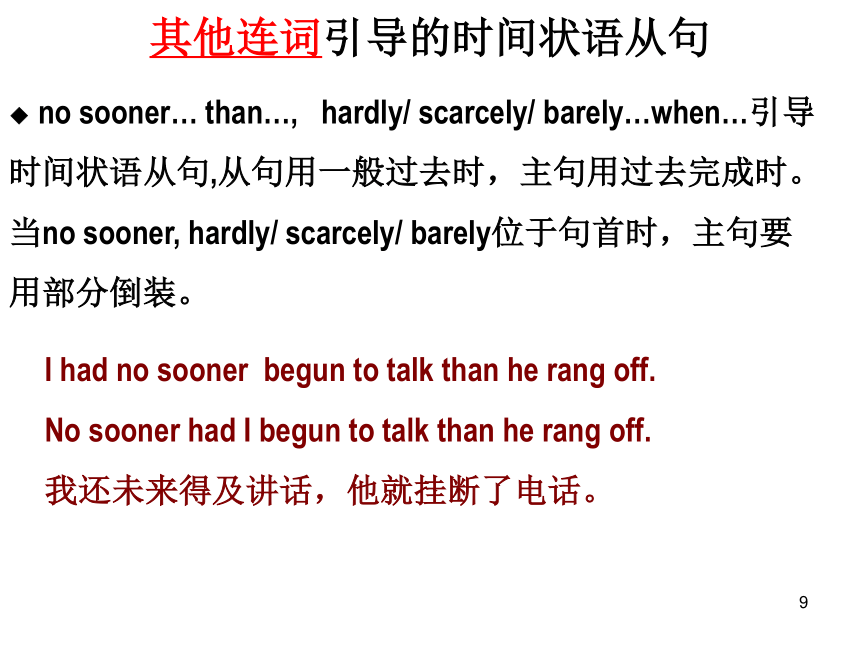
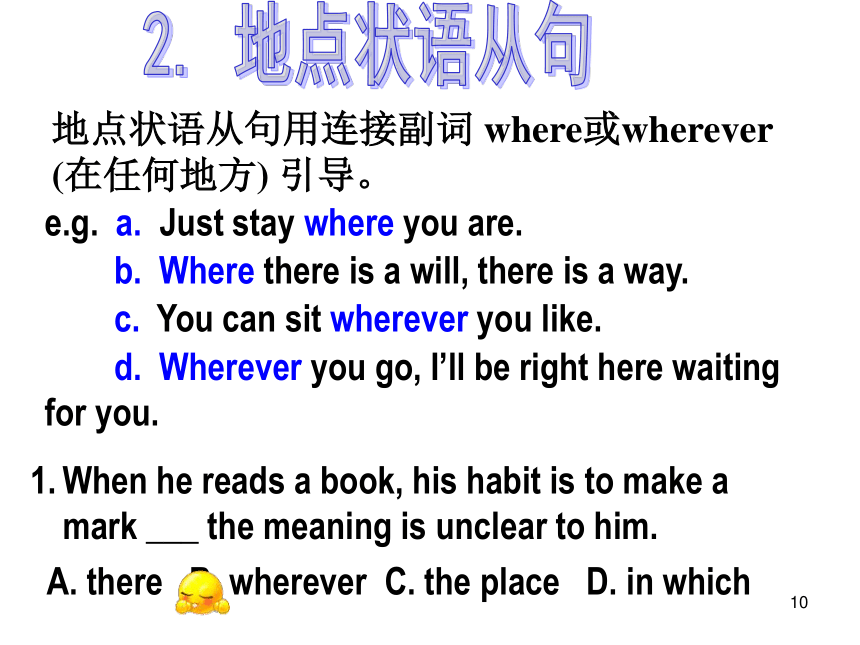
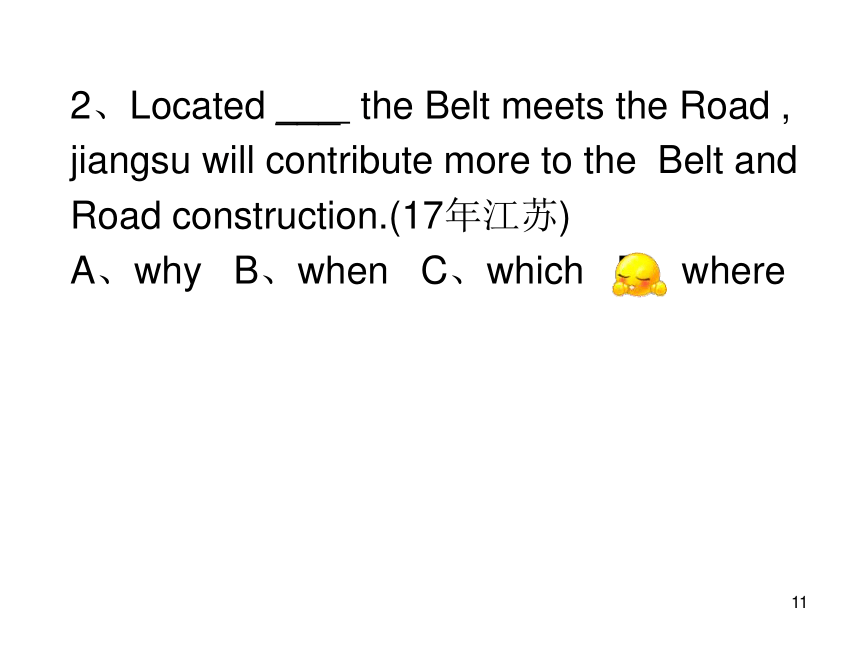
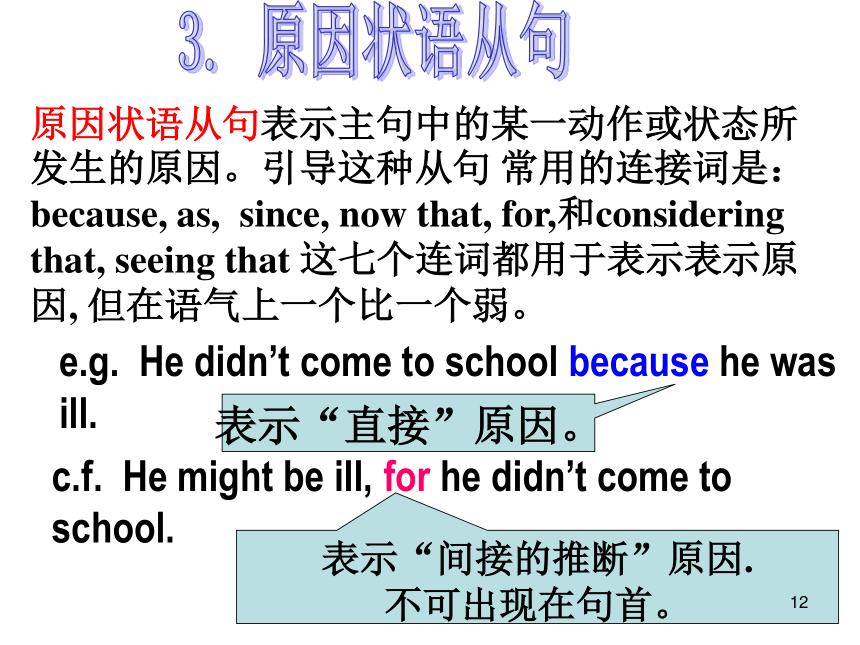
文档简介
课件35张PPT。状语从句1状语时用来修饰 词, 词, 词或
的一种句子成分。它可以表示时间、地点、
原因、目的、结果、条件、让步、比较、方式等。
当充当状语的部分是一个句子时,也就是状语从
句。分类如下:动形容副句子什么是状语?1状语从句1. 时间状语从句2. 地点状语从句3. 原因状语从句4. 条件状语从句5. 让步状语从句6. 目的状语从句7. 结果状语从句8. 方式状语从句9. 比较状语从句11.时间状语从句引导词可分为两部分. as
while
when
whenever
before
after
until (till)
since
as soon asevery time
next time
the first/…time
the moment
the minute/…
instantly
immediately
directly (一…就…)1 as引导的时间状语从句, 可以表达“正当……”, “一 边……一边……”,“随着……”等意思。 1. as, while , when的区别1 when 既可以引导“时间点”,也可以引导“时间段”。While 引导时间状语时只能引导“时间段”,可与when换用。但作为并列连词时,意为“而,却”,表示对比。 when 既可以引导“时间点”,也可以引导“时间段”。While 引导时间状语时只能引导“时间段”,可与when换用。但作为并列连词时,意为“而,却”,表示对比。When 既可以引导“时间点”,也可以引导“时间段”。
e.g. While 引导时间状语从句时只能引导“时间段”,可与 when 换用。但作为并列连词时,意为“而、却”,表示对比。1高考链接:
1、It was the middle of the night ______my father woke me up and told me to watch the football game.(2014 江西) 2、_____she grew older, she became more beautiful 3、I like listening to music ______ I am doing my homework. 4、How could I live in Los Angeles________all my favorite people live here? whenAsWhilewhensince引导的时间状语从句◆ since引导的时间状语从句,常译为“自从……”,
主句常用现在完成时,从句常用一般过去时。 例句翻译:我们自从分手以后一直没见过面。We haven’t seen each other since we parted. 常用句型:It has been (is) + 时间段 + since从句
“自从……有多长时间了 ”例句翻译:自从她大学毕业已经有六年时间了。It has been (is) six years since she graduated from the university. 1as soon as引导的时间状语从句◆ as soon as 引导的时间状语从句,译为“一…就…”,
表示从句动作一发生,主句的动作马上就发生。 例句:他一回来我就告诉他这件事。I will tell him about it as soon as he comes back. ◆相当于as soon as 用法的词或短语还有:immediately,
directly, instantly, the moment, the minute, the instant等.I’ll give him your message the minute he arrives. Directly I had done it, I knew I had made a mistake. 1其他连词引导的时间状语从句◆ no sooner… than…, hardly/ scarcely/ barely…when…引导
时间状语从句,从句用一般过去时,主句用过去完成时。
当no sooner, hardly/ scarcely/ barely位于句首时,主句要
用部分倒装。I had no sooner begun to talk than he rang off.
No sooner had I begun to talk than he rang off.
我还未来得及讲话,他就挂断了电话。1地点状语从句用连接副词 where或wherever (在任何地方) 引导。e.g. a. Just stay where you are.
b. Where there is a will, there is a way.
c. You can sit wherever you like.
d. Wherever you go, I’ll be right here waiting for you.When he reads a book, his habit is to make a mark ___ the meaning is unclear to him.
A. there B. wherever C. the place D. in which2. 地点状语从句12、Located ___ the Belt meets the Road ,
jiangsu will contribute more to the Belt and
Road construction.(17年江苏)
A、why B、when C、which D、where1原因状语从句表示主句中的某一动作或状态所发生的原因。引导这种从句 常用的连接词是:because, as, since, now that, for,和considering that, seeing that 这七个连词都用于表示表示原因, 但在语气上一个比一个弱。e.g. He didn’t come to school because he was ill.c.f. He might be ill, for he didn’t come to school.表示“直接”原因。表示“间接的推断”原因.
不可出现在句首。3. 原因状语从句1because, since, as, for的区别:because—直接原因,非推断.语气最强.
回答why的问题。
since – 通常放句首.译为“既然”
as– 不谈自明的原因,语气最弱。
for– 放句中,引导后半句表原因, 或补充推断
的理由。11. I danced in front of the people _________ I liked it.
2. You’d better wear strong shoes _____ we’ll do
a lot of walking.
3. ____ he was not well, I decided to go without him.
4. ______ everybody know about it, I don’t want to
talk any more.
5. He must be ill, ____ he is absent Today.
6. Some people believe that ______ oil is running out,
the fate of the motor industry is uncertain.becauseasAsSinceforsince1 条件状语从句表示主句中的某一动作或状态是在什么情况或条件下发生的。条件状语从句中通常用一般现在时表示将来。条件状语从句由从属连词引导:if, unless (除非), as / so long as (只要), on condition (只要), once ( 一旦), in case (假使) , providing / provided (that) 等。e.g. a.We’ll come over to see you on Saturday if we
have time.
b. We should serve the people as / so long as we live.4. 条件状语从句11. We will be able to get there on time, ____ our car doesn’t break down on the road.
as soon as B. as far as
C. as long as D. as well as
2. In time of serious accidents, _____ we know some basic things about first aid, we can save lives.
whether B. until
C. if D. unless
3. ____ you have tried it, you can’t imagine how pleasant it is.
A. Unless B. Because
C. Although D. When1 在复合句中表示让步概念的状语从句被称为让步状语
从句。常用引导词:though, although, even if, even though,
no matter + 疑问词(what/ who/ where/ when/ which/ how)
疑问词-ever
(whatever, whoever, wherever, whenever, however, whichever)特殊引导词: as (用在让步状语从句中必须要倒装),
while ( 一般用在句首 ),
whether… or… , whether (…) or not5. 让步状语从句1though, although ◆ 判断以下句子是否正确:
Although he is rich, but he is not happy.
Although he is rich, yet he is not happy.
Although we have grown up, our parents still treat us as children. ◆要点归纳:
though, although当“虽然”讲, 都不能和 but 连用.
但是他们都可以同yet (still) 连用. ever if, even thougheven if 和 even though 表示“ ” 即使We’ll make a trip even though the weather is bad. 1as引导让步状语从句 as 引导的让步状语从句,必须将从句中的 、 、
以及谓语中的 提前至从句句首,作表语的单数
可数名词前如有冠词,冠词需 。 表语状语实意动词省略Though he works hard, he makes little progress. Hard as/though he works, he makes little progress. Though he was a child, he knew what was the right thing to do.Child as/though he was, he knew what was the right thing to do. 1whether… or… , whether (…) or notwhether… or… , whether … or not 表示“不论是否……”,
“不管是……还是……”。其引导的从句旨在说明正反两
方面的可能性都不会影响主句的意向或结果。Whether you believe it or not, it is true. You’ll have to attend the party whether you are free or busy. while 也可以引导让步状语从句,意为“尽管”,语气比
though/ although弱。其引导的从句一般位于 。句首例句:我尽管喜欢它的颜色,但不喜欢它的形状。While I like its color, I don’t like its shape. 1no matter + 疑问词 疑问词-everNo matter what happened, he would not mind.
Whatever happened, he would not mind. 替换:no matter what = whatever
no matter who = whoever
no matter when = whenever
no matter where = wherever
no matter which = whichever
no matter how = however 判断正误:
No matter what you say is of no use now.
Whatever you say is of no use now. 归纳:
no matter+疑问词不能引导主语从句和宾语从句,
而 “疑问词+ever”则可以 1____ I accept that he is not perfect, I do actually like the person.
A. While B. since C. Before D. Unless
2. The workers are determined to go through with their railway project, ____ the expenses have risen.
A. as long as B. even though
C. now that D. as though
3. I really want the match, however much ______.
A. does it cost B. costs it
C. will it cost D. it costs
14. ______ we have finished the course, we shall start doing more revision work.
A. For now B. Now that C. By now D. until
5. ______, the idea of having to work under a woman defeated him.
A. Wanting the job very much
B. Although wanting the job badly
C. Though he wanted the job very much
D. He wanted the job badly1引导目的状语从句的连词:in order that …用于正式文体中,所引导从句可位于主句前或后。so thata. 较常用,一般用于主句后,有时可分开,so 有时可省; 从句中要有情态动词, 否则, 就成为下一种句型:b. 无情态动词则引导结果状语从句。for fear that; in case; lest (以免)等。6. 目的状语从句1e.g. a. We’ll sit nearer the front so that we can
hear better.
b. I shall write it down lest I should forget. 注意:当从句与主句的主语一致时,可用
so as to do … 或 in order to do …e.g. He ran fast so that he might arrive there
before ten o’clock. → He ran fast so as to arrive there before ten o’clock.1结果状语从句常位于主句之后,由 so,
so … that, such … that; so that 等引导。 a. So quickly did he run that I couldn’t catch up with him.
b. The bus broke down so that we had to walk home.
c. She is such a good teacher that everyone admires her.
★d. He got to the station finally, only to find the train had left.7. 结果状语从句1描述主句动作进行方式的状语被称为方式状语。通常用下列词语引导: as, just as, as if, as though, the way (that), in the way (that)等。 a. We must do as the Party tells us.
b. Leave the things as they are.
c. Most plants need sunlight just as they need water.
d. It sounds as if it is raining.
e. They did it in a way that I had never seen before.
他们以我从没见过的方式行事。
f. As water is to fish, so air is to man.
我们离不开空气,犹如鱼儿离不开水8. 方式状语从句1比较状语从句常由下列词语引导: as …as, not so / as … as, more…than, less … than, the more + adj. / adv., the more + adj. / adv.a. He is not so / as healthy as his brother. b. They jumped up and down as hard as they could. c. John is less clever than Peter.
d. The busier he is, the happier he feels.
e. The job is not so difficult as I thought it would be.
f. Send for a doctor as soon as (it is ) possible.9. 比较状语从句1Roses need special care ______ they can live through winter.
A. because B. so that C. even if D. as
2. If things are left ______ they are, the problems will never be settled, I’m afraid.
A. how B. as C. what D. where
3. Careful surveys have pointed out that as many as 50 percent of the patients do not take drugs _____ directed.
A. like B. so C. which D. as
4. I dare not go there ______ my parents will see me.
A. in case of B. for fear of
C. in order that D. for fear that1 ★ 注意区分不同从句:引导的是什么从句,不仅要根据连词,还要根据句子结构和句意来判别。以where为例,能引导多种从句。
You are to find it where you left it.(地点状语从句)
Tell me the address where he lives. (定语从句,句中有先行词)
I don’t know where he came from.(宾语从句)
Where he has gone is not known yet. (主语从句)
This place is where they once hid.
(表语从句)1 部分状语从句可用省略形式:
even if, if , once, while, though, unless, when, as if etc.
The flower his friends gave him will die unless (it is) watered every day..
Even if (I am) invited, I won’t go there.
Once (you are) caught sleeping in class, you’ll be punished by your head-teacher .
Though (he was) surprised to see us, he gave us a warm welcome.
She won’t speak to anyone unless (she is) asked to.
When (it is) compared with the old one, our new house is really like a palace.
These young man volunteered to go wherever (they are) needed.11
2016-2017年高考状语从句试题汇编
1.(2016北京卷27)My grandfather still plays tennis now and then, _______ he’s in his nineties.
A.as long as B. as if C. even though D. in case
2.(2016北京卷33) I really enjoy listening to music _______ it helps me relax and takes my mind away from other cares of the day.
A.because B. before C. unless D. until
3.(2016天津卷7)_______ the average age of the population increases, there are more and more old people to care for.
A.Unless B. Until C. As D. While
1
4.(2016浙江卷5)_______ online shopping has changed our life , not all of its effects have been positive.
A.Since B. After C. While D. Unless
5.(2016江苏卷26)_______ some people are motivated by a need for success, others are motivated by a fear of failure.
A.Because B. If C. Unless D. While
6.(2017北京卷25)_______ birds use their feathers for flight, some of their feathers are for other purposes.
A. Once B. If C. Although D. Because1
7.(2017北京卷28)If you don’t understand something, you may research, study, and talk to other people _______ you figure it out.
A. because B. though C. until D. since
8、. I was so familiar with him that I recognized his voice ______ I picked up the phone.
A. while B. after
C. in case D. the minute
9、. How long do you think it will take _______ our product becomes popular with the consumers
A. when B. until C. before D. since
10. ______ the day went on, the weather got worse.
A. With B. since C. As D. Whilethank you!12018年11月11日
的一种句子成分。它可以表示时间、地点、
原因、目的、结果、条件、让步、比较、方式等。
当充当状语的部分是一个句子时,也就是状语从
句。分类如下:动形容副句子什么是状语?1状语从句1. 时间状语从句2. 地点状语从句3. 原因状语从句4. 条件状语从句5. 让步状语从句6. 目的状语从句7. 结果状语从句8. 方式状语从句9. 比较状语从句11.时间状语从句引导词可分为两部分. as
while
when
whenever
before
after
until (till)
since
as soon asevery time
next time
the first/…time
the moment
the minute/…
instantly
immediately
directly (一…就…)1 as引导的时间状语从句, 可以表达“正当……”, “一 边……一边……”,“随着……”等意思。 1. as, while , when的区别1 when 既可以引导“时间点”,也可以引导“时间段”。While 引导时间状语时只能引导“时间段”,可与when换用。但作为并列连词时,意为“而,却”,表示对比。 when 既可以引导“时间点”,也可以引导“时间段”。While 引导时间状语时只能引导“时间段”,可与when换用。但作为并列连词时,意为“而,却”,表示对比。When 既可以引导“时间点”,也可以引导“时间段”。
e.g. While 引导时间状语从句时只能引导“时间段”,可与 when 换用。但作为并列连词时,意为“而、却”,表示对比。1高考链接:
1、It was the middle of the night ______my father woke me up and told me to watch the football game.(2014 江西) 2、_____she grew older, she became more beautiful 3、I like listening to music ______ I am doing my homework. 4、How could I live in Los Angeles________all my favorite people live here? whenAsWhilewhensince引导的时间状语从句◆ since引导的时间状语从句,常译为“自从……”,
主句常用现在完成时,从句常用一般过去时。 例句翻译:我们自从分手以后一直没见过面。We haven’t seen each other since we parted. 常用句型:It has been (is) + 时间段 + since从句
“自从……有多长时间了 ”例句翻译:自从她大学毕业已经有六年时间了。It has been (is) six years since she graduated from the university. 1as soon as引导的时间状语从句◆ as soon as 引导的时间状语从句,译为“一…就…”,
表示从句动作一发生,主句的动作马上就发生。 例句:他一回来我就告诉他这件事。I will tell him about it as soon as he comes back. ◆相当于as soon as 用法的词或短语还有:immediately,
directly, instantly, the moment, the minute, the instant等.I’ll give him your message the minute he arrives. Directly I had done it, I knew I had made a mistake. 1其他连词引导的时间状语从句◆ no sooner… than…, hardly/ scarcely/ barely…when…引导
时间状语从句,从句用一般过去时,主句用过去完成时。
当no sooner, hardly/ scarcely/ barely位于句首时,主句要
用部分倒装。I had no sooner begun to talk than he rang off.
No sooner had I begun to talk than he rang off.
我还未来得及讲话,他就挂断了电话。1地点状语从句用连接副词 where或wherever (在任何地方) 引导。e.g. a. Just stay where you are.
b. Where there is a will, there is a way.
c. You can sit wherever you like.
d. Wherever you go, I’ll be right here waiting for you.When he reads a book, his habit is to make a mark ___ the meaning is unclear to him.
A. there B. wherever C. the place D. in which2. 地点状语从句12、Located ___ the Belt meets the Road ,
jiangsu will contribute more to the Belt and
Road construction.(17年江苏)
A、why B、when C、which D、where1原因状语从句表示主句中的某一动作或状态所发生的原因。引导这种从句 常用的连接词是:because, as, since, now that, for,和considering that, seeing that 这七个连词都用于表示表示原因, 但在语气上一个比一个弱。e.g. He didn’t come to school because he was ill.c.f. He might be ill, for he didn’t come to school.表示“直接”原因。表示“间接的推断”原因.
不可出现在句首。3. 原因状语从句1because, since, as, for的区别:because—直接原因,非推断.语气最强.
回答why的问题。
since – 通常放句首.译为“既然”
as– 不谈自明的原因,语气最弱。
for– 放句中,引导后半句表原因, 或补充推断
的理由。11. I danced in front of the people _________ I liked it.
2. You’d better wear strong shoes _____ we’ll do
a lot of walking.
3. ____ he was not well, I decided to go without him.
4. ______ everybody know about it, I don’t want to
talk any more.
5. He must be ill, ____ he is absent Today.
6. Some people believe that ______ oil is running out,
the fate of the motor industry is uncertain.becauseasAsSinceforsince1 条件状语从句表示主句中的某一动作或状态是在什么情况或条件下发生的。条件状语从句中通常用一般现在时表示将来。条件状语从句由从属连词引导:if, unless (除非), as / so long as (只要), on condition (只要), once ( 一旦), in case (假使) , providing / provided (that) 等。e.g. a.We’ll come over to see you on Saturday if we
have time.
b. We should serve the people as / so long as we live.4. 条件状语从句11. We will be able to get there on time, ____ our car doesn’t break down on the road.
as soon as B. as far as
C. as long as D. as well as
2. In time of serious accidents, _____ we know some basic things about first aid, we can save lives.
whether B. until
C. if D. unless
3. ____ you have tried it, you can’t imagine how pleasant it is.
A. Unless B. Because
C. Although D. When1 在复合句中表示让步概念的状语从句被称为让步状语
从句。常用引导词:though, although, even if, even though,
no matter + 疑问词(what/ who/ where/ when/ which/ how)
疑问词-ever
(whatever, whoever, wherever, whenever, however, whichever)特殊引导词: as (用在让步状语从句中必须要倒装),
while ( 一般用在句首 ),
whether… or… , whether (…) or not5. 让步状语从句1though, although ◆ 判断以下句子是否正确:
Although he is rich, but he is not happy.
Although he is rich, yet he is not happy.
Although we have grown up, our parents still treat us as children. ◆要点归纳:
though, although当“虽然”讲, 都不能和 but 连用.
但是他们都可以同yet (still) 连用. ever if, even thougheven if 和 even though 表示“ ” 即使We’ll make a trip even though the weather is bad. 1as引导让步状语从句 as 引导的让步状语从句,必须将从句中的 、 、
以及谓语中的 提前至从句句首,作表语的单数
可数名词前如有冠词,冠词需 。 表语状语实意动词省略Though he works hard, he makes little progress. Hard as/though he works, he makes little progress. Though he was a child, he knew what was the right thing to do.Child as/though he was, he knew what was the right thing to do. 1whether… or… , whether (…) or notwhether… or… , whether … or not 表示“不论是否……”,
“不管是……还是……”。其引导的从句旨在说明正反两
方面的可能性都不会影响主句的意向或结果。Whether you believe it or not, it is true. You’ll have to attend the party whether you are free or busy. while 也可以引导让步状语从句,意为“尽管”,语气比
though/ although弱。其引导的从句一般位于 。句首例句:我尽管喜欢它的颜色,但不喜欢它的形状。While I like its color, I don’t like its shape. 1no matter + 疑问词 疑问词-everNo matter what happened, he would not mind.
Whatever happened, he would not mind. 替换:no matter what = whatever
no matter who = whoever
no matter when = whenever
no matter where = wherever
no matter which = whichever
no matter how = however 判断正误:
No matter what you say is of no use now.
Whatever you say is of no use now. 归纳:
no matter+疑问词不能引导主语从句和宾语从句,
而 “疑问词+ever”则可以 1____ I accept that he is not perfect, I do actually like the person.
A. While B. since C. Before D. Unless
2. The workers are determined to go through with their railway project, ____ the expenses have risen.
A. as long as B. even though
C. now that D. as though
3. I really want the match, however much ______.
A. does it cost B. costs it
C. will it cost D. it costs
14. ______ we have finished the course, we shall start doing more revision work.
A. For now B. Now that C. By now D. until
5. ______, the idea of having to work under a woman defeated him.
A. Wanting the job very much
B. Although wanting the job badly
C. Though he wanted the job very much
D. He wanted the job badly1引导目的状语从句的连词:in order that …用于正式文体中,所引导从句可位于主句前或后。so thata. 较常用,一般用于主句后,有时可分开,so 有时可省; 从句中要有情态动词, 否则, 就成为下一种句型:b. 无情态动词则引导结果状语从句。for fear that; in case; lest (以免)等。6. 目的状语从句1e.g. a. We’ll sit nearer the front so that we can
hear better.
b. I shall write it down lest I should forget. 注意:当从句与主句的主语一致时,可用
so as to do … 或 in order to do …e.g. He ran fast so that he might arrive there
before ten o’clock. → He ran fast so as to arrive there before ten o’clock.1结果状语从句常位于主句之后,由 so,
so … that, such … that; so that 等引导。 a. So quickly did he run that I couldn’t catch up with him.
b. The bus broke down so that we had to walk home.
c. She is such a good teacher that everyone admires her.
★d. He got to the station finally, only to find the train had left.7. 结果状语从句1描述主句动作进行方式的状语被称为方式状语。通常用下列词语引导: as, just as, as if, as though, the way (that), in the way (that)等。 a. We must do as the Party tells us.
b. Leave the things as they are.
c. Most plants need sunlight just as they need water.
d. It sounds as if it is raining.
e. They did it in a way that I had never seen before.
他们以我从没见过的方式行事。
f. As water is to fish, so air is to man.
我们离不开空气,犹如鱼儿离不开水8. 方式状语从句1比较状语从句常由下列词语引导: as …as, not so / as … as, more…than, less … than, the more + adj. / adv., the more + adj. / adv.a. He is not so / as healthy as his brother. b. They jumped up and down as hard as they could. c. John is less clever than Peter.
d. The busier he is, the happier he feels.
e. The job is not so difficult as I thought it would be.
f. Send for a doctor as soon as (it is ) possible.9. 比较状语从句1Roses need special care ______ they can live through winter.
A. because B. so that C. even if D. as
2. If things are left ______ they are, the problems will never be settled, I’m afraid.
A. how B. as C. what D. where
3. Careful surveys have pointed out that as many as 50 percent of the patients do not take drugs _____ directed.
A. like B. so C. which D. as
4. I dare not go there ______ my parents will see me.
A. in case of B. for fear of
C. in order that D. for fear that1 ★ 注意区分不同从句:引导的是什么从句,不仅要根据连词,还要根据句子结构和句意来判别。以where为例,能引导多种从句。
You are to find it where you left it.(地点状语从句)
Tell me the address where he lives. (定语从句,句中有先行词)
I don’t know where he came from.(宾语从句)
Where he has gone is not known yet. (主语从句)
This place is where they once hid.
(表语从句)1 部分状语从句可用省略形式:
even if, if , once, while, though, unless, when, as if etc.
The flower his friends gave him will die unless (it is) watered every day..
Even if (I am) invited, I won’t go there.
Once (you are) caught sleeping in class, you’ll be punished by your head-teacher .
Though (he was) surprised to see us, he gave us a warm welcome.
She won’t speak to anyone unless (she is) asked to.
When (it is) compared with the old one, our new house is really like a palace.
These young man volunteered to go wherever (they are) needed.11
2016-2017年高考状语从句试题汇编
1.(2016北京卷27)My grandfather still plays tennis now and then, _______ he’s in his nineties.
A.as long as B. as if C. even though D. in case
2.(2016北京卷33) I really enjoy listening to music _______ it helps me relax and takes my mind away from other cares of the day.
A.because B. before C. unless D. until
3.(2016天津卷7)_______ the average age of the population increases, there are more and more old people to care for.
A.Unless B. Until C. As D. While
1
4.(2016浙江卷5)_______ online shopping has changed our life , not all of its effects have been positive.
A.Since B. After C. While D. Unless
5.(2016江苏卷26)_______ some people are motivated by a need for success, others are motivated by a fear of failure.
A.Because B. If C. Unless D. While
6.(2017北京卷25)_______ birds use their feathers for flight, some of their feathers are for other purposes.
A. Once B. If C. Although D. Because1
7.(2017北京卷28)If you don’t understand something, you may research, study, and talk to other people _______ you figure it out.
A. because B. though C. until D. since
8、. I was so familiar with him that I recognized his voice ______ I picked up the phone.
A. while B. after
C. in case D. the minute
9、. How long do you think it will take _______ our product becomes popular with the consumers
A. when B. until C. before D. since
10. ______ the day went on, the weather got worse.
A. With B. since C. As D. Whilethank you!12018年11月11日
